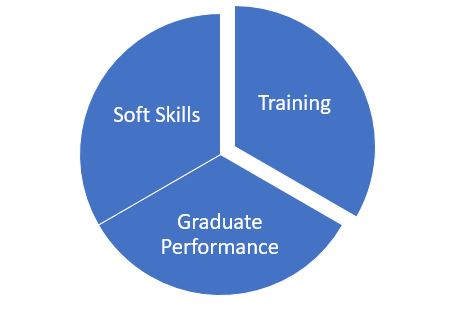Nexus between soft skills training and business graduates' performance: an empirical study based on Bangladesh
Abstract
Soft skills are the expected qualities of the business graduates to take part in purposeful intercommunications to establish a synergic, productive, and flourishing work environment which are crucial for the growingly competitive corporate world. The main purpose of this study is to investigate the relationship between soft skills training and business graduates' performance. There were limited studies found on soft skills training and business graduates' performance in the Bangladeshi context and this study bridges the existing research gap. A structured questionnaire was prepared to collect the primary data. The questionnaire was delivered randomly to business schools in Bangladesh through an online platform because of the Covid-19 pandemic. A total of 352 valid responses were accumulated from this online survey. To analyze the data, descriptive statistics, and chi-square tests were applied. It was found that 84.1% of respondents agreed that soft skills training increased professional performance. The study also revealed that 38.6% of students felt bored during soft skills training sessions. However, almost 43.2% of students were opposed to this statement. From the study, it is recommended that soft skills training should be made compulsory in the Bangladeshi business school curriculum to ensure efficiency and effectiveness in future professional performance.
Downloads
References
Ahmed, A., & Rehman, A. U. (2020). Role of Leadership Competencies in Innovation in Organizational Performance. 1(2), 39–59. https://doi.org/10.5281/zenodo.4060741
Asbari, M., Purwanto, A., Maesaroh, S., Hutagalung, D., Mustikasiwi, A., Ong, F., & Andriyani, Y. (2020). Impact of Hard Skills, Soft Skills and Organizational Culture : Lecturer Innovation Competencies As Mediating. EduPsyCouns: Journal of Education, Psychology and Counseling, 2(1), 142–155.
Binsaeed, R. H., Unnisa, S. T., & Rizvi, J. L. (2017). the Big Impact of Soft Skills in Today’S Workplace. International Journal of Economics, Commerce and Management, 5(1), 456–463.
Choudary, D. V., Trainer, S., & Scientific, A. (2016). Abhinav International Monthly Refereed Journal of Research in Management & Technology MANAGING RESISTANCE TO TRAINING : HRM Abhinav International Monthly Refereed Journal of Research In. 5(12), 28–31.
Deshkar, R. (2020). A study of Contribution of NGOs in Human Resource Development. International Journal of Economics, Business and Human Behaviour, 1(3), 30–48. https://doi.org/10.5281/zenodo.4084828
Fikri, M. A., Asbari, M., Purwanto, A., Nugroho, Y., Waruwu, H., Fauji, A., Shobihi, A. W., Singgih, E., Sudiyono, R., Agistiawati, E., & Dewi, W. (2020). a Mediation Role of Organizational Learning on Relationship of Hard Skills, Soft Skills, Innovation and Performance: Evidence At Islamic School. EduPsyCouns: Journal of Education, Psychology and Counseling, 2(1), 365–383.
Flippo, E. B. (1984). Personnel management. McGraw-Hill.
Gruzdev, M. V., Kuznetsova, I. V., Tarkhanova, I. Y., & Kazakova, E. I. (2018). University graduates’ soft skills: The employers’ opinion. European Journal of Contemporary Education, 7(4), 690–698. https://doi.org/10.13187/ejced.2018.4.690
Hunt, J. W., & Baruch, Y. (2003). Developing top managers: the impact of interpersonal skills training. Journal of Management Development, 22(8), 729–752. https://doi.org/10.1108/02621710310487882
Husain, U., & Javed, S. (2019a). Impact of Climate Change on Agriculture and Indian Economy : A Quantitative Research Perspective from 1980 to 2016. Industrial Engineering & Management, 8(2), 2–5. https://www.hilarispublisher.com/open-access/impact-of-climate-change-on-agriculture-and-indian-economy-a-quantitative-research-perspective-from-1980-to-2016.pdf
Husain, U., & Javed, S. (2019b). Stock Price Movement And Volatility In Muscat Security Market ( MSM ). International Journal of Research - Granthaalayah, 7(February), 68–84. https://doi.org/10.5281/zenodo.2580535
Ibrahim, R., Boerhannoeddin, A., & Bakare, K. K. (2017). The effect of soft skills and training methodology on employee performance. European Journal of Training and Development, 41(4), 388–406. https://doi.org/10.1108/EJTD-08-2016-0066
Javed, S. (2017). Unified Theory Of Acceptance And Use Of Technology (UTAUT) Model-Mobile Banking. Journal of Internet Banking and Commerce, 22(3), 1–20. https://www.icommercecentral.com/open-access/unified-theory-of-acceptance-and-use-of-technology-utaut-modelmobile-banking.php?aid=86597
Javed, S. (2018). Does Organisation Behaviour Affect Performance Of Auditing Firms? International Journal of Engineering Technologies and Management Research, 5(1), 90–98. https://doi.org/10.5281/zenodo.1171842
Javed, S., Atallah, B., Aldalaien, E., & Husain, U. (2019). Performance of Venture Capital Firms in UK : Quantitative Research Approach of 20 UK Venture Capitals. Middle-East Journal of Scientific Research, 27(5), 432–438. https://doi.org/10.5829/idosi.mejsr.2019.432.438
Javed, S., & Husain, U. (2021). Corporate CSR practices and corporate performance: managerial implications for sustainable development. Decision, 48(2), 153–164. https://doi.org/10.1007/s40622-021-00274-w
Javed, S., Husain, U., & Ali, S. (2020). Relevancy of Investment Decisions And Consumption With Asset Pricing : GMM And CCAPM Model Approach. International Journal of Management, 11(8), 10–17. https://doi.org/10.34218/IJM.11.8.2020.002
Javed, S., & Khan, A. A. (2017). Analysing Parsimonious Model of OL and OE Using SEM Technique. International Journal of Applied Business and Economic Research, 15(22), 685–712. https://serialsjournals.com/abstract/53799_sarfarz_and_azeem.pdf
Johl, S. K., & Toha, M. A. (2021). The Nexus between Proactive Eco-Innovation and Firm Financial Performance: A Circular Economy Perspective. In Sustainability (Vol. 13, Issue 11). https://doi.org/10.3390/su13116253
John, J. (2009). Study on the Nature of Impact of Soft Skills Training Programme on the Soft Skills Development of Management Students. September 2009, 19–27.
Krejcie, R. V, & Morgan, D. (1970). Determining Sample Size For Research Activities. 607–610.
Malik, M., & Javed, S. (2021). Perceived stress among university students in Oman during COVID-19-induced e-learning. Middle East Current Psychiatry, 28(1), 49. https://doi.org/10.1186/s43045-021-00131-7
Nabi, G. R. (2003). Graduate employment and underemployment: opportunity for skill use and career experiences amongst recent business graduates. Education + Training, 45(7), 371–382. https://doi.org/10.1108/00400910310499947
Nusrat, M., & Sultana, N. (2018). Soft Skills for sustainable employment of Business Graduates of Bangladesh.
Raman, M., Pilani, B., Goa, B., Anjani, C., Koka, S., & Campus, P. (2015). The Ever-Increasing Demand for Soft Skills at Workplace: A Study on IT Professionals’ Perspectives. International Conference on Management and Information Systems, 4–8.
Richens, G., & McClain, C. (2000). Workplace Basic Skills for the New Millennium. Journal of Adult Education, 28(1), 29.
Seetha, S. (2013). International Journal of Engineering , Business and Enterprise Applications ( IJEBEA ) Necessity of Soft Skills Training for students and professionals. 2008, 171–174.
Sopa, A., Asbari, M., Purwanto, A., Budi Santoso, P., Mustofa, Hutagalung, D., Maesaroh, S., Ramdan, M., & Primahendra, R. (2020). Hard skills versus soft skills: Which are more important for indonesian employees innovation capability. International Journal of Control and Automation, 13(2), 156–175.
Succi, C., & Canovi, M. (2020). Soft skills to enhance graduate employability: comparing students and employers’ perceptions. Studies in Higher Education, 45(9), 1834–1847. https://doi.org/10.1080/03075079.2019.1585420
Tang, K. N. (2020). The importance of soft skills acquisition by teachers in higher education institutions. Kasetsart Journal of Social Sciences, 41(1), 22–27. https://doi.org/10.1016/j.kjss.2018.01.002
Thacker, R. A., & Yost, C. A. (2002). Training students to become effective workplace team leaders. Team Performance Management: An International Journal, 8, 89–94. https://doi.org/10.1108/13527590210433384
Tobin, P. (2007). Soft Skills Hard Facts: an Unwritten Symphony. 2001, 1–8.
Toha, M. A., Johl, S. K., & Khan, P. A. (2020). Firm’s Sustainability and Societal Development from the Lens of Fishbone Eco-Innovation: A Moderating Role of ISO 14001-2015 Environmental Management System. In Processes (Vol. 8, Issue 9). https://doi.org/10.3390/pr8091152
Young, E. (2012). How to win fans and influence people. New Scientist, 214(2870), 38–41. https://doi.org/10.1016/S0262-4079(12)61634-0

Copyright (c) 2021 INTERNATIONAL JOURNAL OF ECONOMICS, BUSINESS AND HUMAN BEHAVIOUR

This work is licensed under a Creative Commons Attribution-NonCommercial 4.0 International License.











